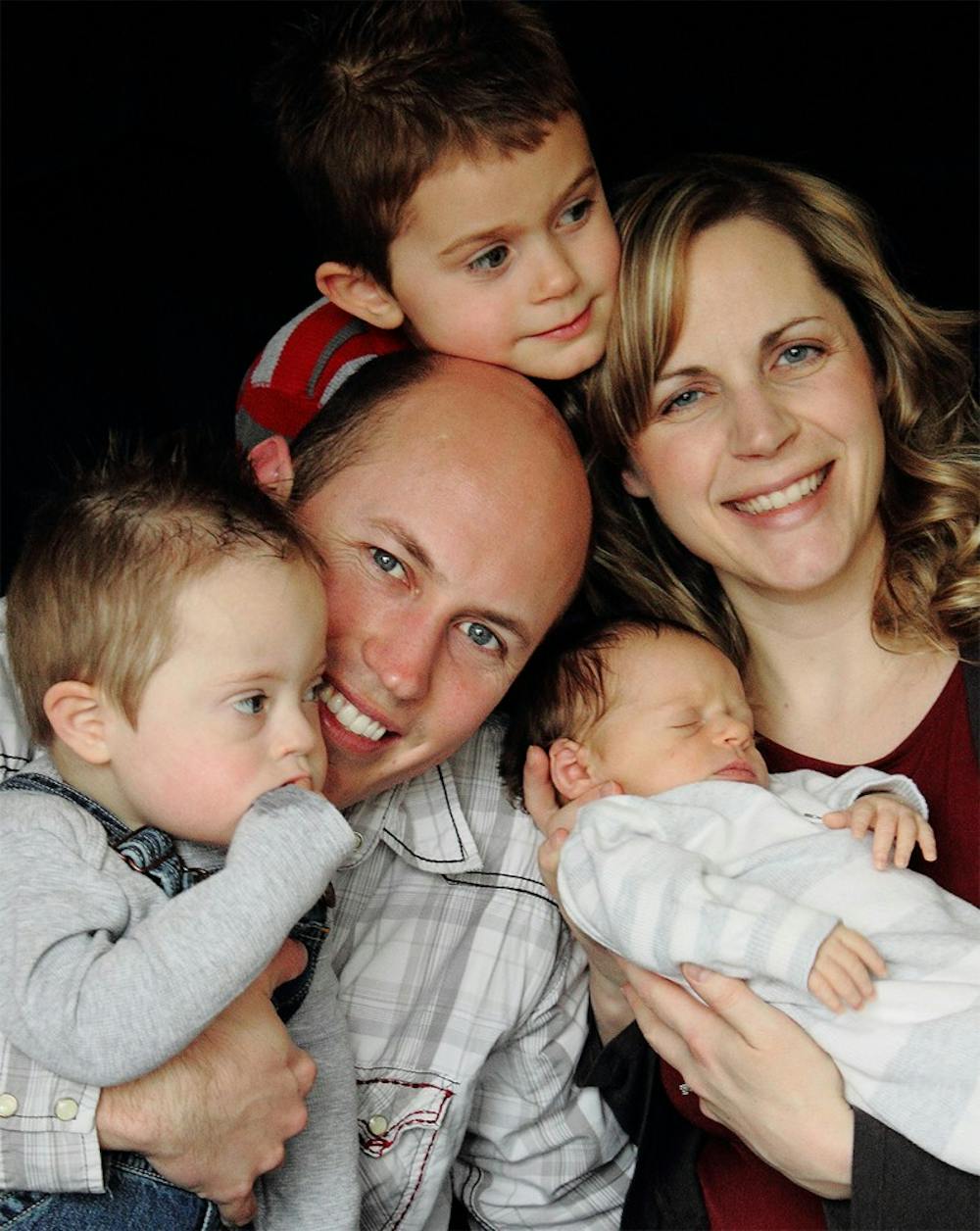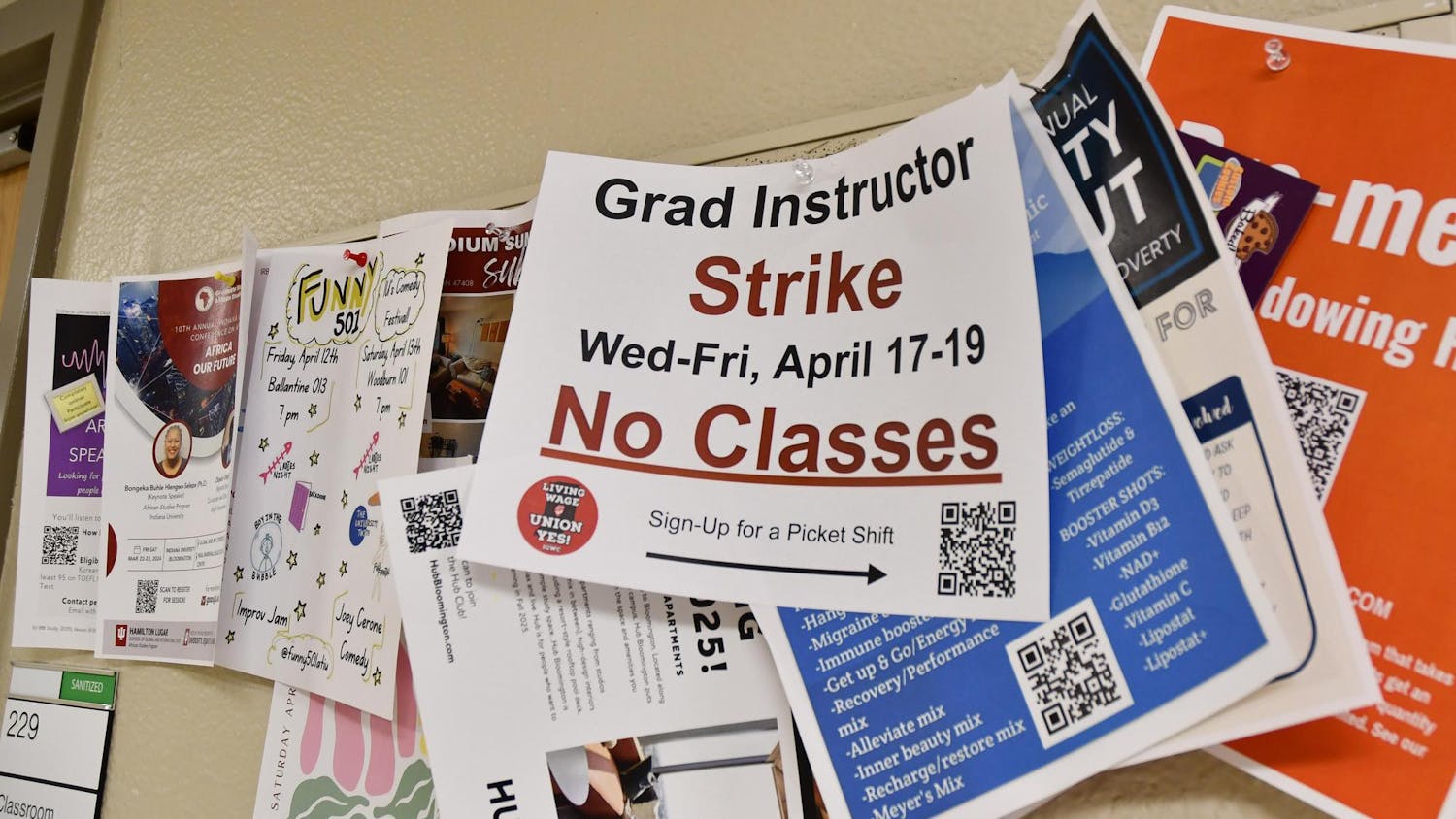“Does he have Down syndrome?”
There were no other markers of the disability — no creases across the infant’s palms, no extra space between his toes — but there was something about his eyes.
“No,” her husband Daniel said to keep her calm. She still hadn’t been stitched up from her C-section. “He doesn’t.”
But he knew.
As many as 85 percent of Down syndrome pregnancies are terminated when parents learn the baby has the disability, according to a 2012 Prenatal Diagnosis study.
By July 1, the choice to abort those children could be off the table. The Indiana General Assembly is considering a slew of anti-abortion bills in 2015, including Senate Bill 334, which would prohibit abortion based on sex or disability. Down syndrome is mentioned specifically several times in the text of the bill.
Adrienne didn’t know Timothy had Down syndrome until after delivery, but genetic testing and that foresight wouldn’t have changed her choice to continue with the pregnancy.
She doesn’t agree with the option. Doctors who offer the option of abortion in Down syndrome cases make Daniel cringe.
In a conservative state such as Indiana, this bill could alter the way children with Down syndrome are looked at and their rights in utero. The debate isn’t as simple as it was a few decades ago, though — now people are advocating for disabled children, putting them into customized learning programs instead of institutions and attempting to integrate them into society instead of isolating them.
Timothy was not a choice, Adrienne said. Yes, raising him can be tough. Timothy develops more slowly than other children and had seven surgeries in his first year and a half of life for intestinal and tracheal complications. Still, he’s compassionate and pure and happy.
Adrienne said she’ll never forget the day after the open-heart surgery for his tracheal reconstruction.
Less than 24 hours after his procedure, she said, he was smiling at the nurses.
***
Arthur Caplan said Senate Bill 334 is not a bill about limiting abortion. It’s about limiting choice.
It’s about creating legislation to help disabled children when they’re kids, but not having enough resources for them to thrive as adults. It’s intrusive. It cuts into a family’s rights.
“It’s certainly understandable that legislators would want to protect people with disabilities, but decisions about making a family, about having a family, still are best left to parents,” said Caplan, the founding director of the Division of Medical Ethics in New York University-Langone Medical Center’s Department of Population Health.
Legislators tend to be concerned about children with Down syndrome when they’re young and cute, he said. If they want to pass this legislation, they need to make sure Indiana has good adult programs for disabled people. The state needs good training and employment programs that will enhance the Down syndrome lives they legislated into existence.
When kids are in school, Caplan said, Indiana needs to make sure they can be a cheerleader on the high school squad. They need to be able to earn a varsity letter.
In the Sturgeon’s basement, their son Aaron, 4, emerges from behind his play tent holding purple 5-pound weights above his head.
He heard his parents talking about Timothy’s limited abilities.
“I’ll play real sports,” Aaron said proudly.
Timothy, now 2, turns from the couch, where he’s bracing himself with both hands, unsteady on his feet. He stares at Aaron, wide-eyed. He opens his mouth in an awestruck smile.
“He’ll still play sports, but they’ll be a little different” Adrienne said.
Caplan said it’s dangerous for politics and family to mix. He said Senate Bill 334 is unethical; parents should be able to choose what’s right for their family.
“But for parents, they’re thinking, ‘My choice,’” Caplan said. “‘I build a family. I’m not interested in what the legislator thinks unless he’s ready to come here and parent.’”
Planned Parenthood echoes this sentiment.
“Legislators have no business making these decisions for families, who, in these situations, are experiencing a difficult diagnosis from what is often a very wanted pregnancy,” said Tammy Lieber, director of communications for the Indiana and Kentucky branch of Planned Parenthood, in an email.
Legislators should focus their energies on funding programs to help disabled Hoosiers and those who care for them, she said.
Jody Madeira, a professor of law at IU’s Maurer School of Law, said she’d be surprised if the bill doesn’t pass, but also said it would be nearly impossible to enforce.
“The question is, in a world where a woman does not need to specify why she’s getting an abortion, how can you practically enforce this law?” she said.
Sex-selective laws are one of the most popular bills to pass because they don’t ever sound unreasonable, Madeira explained — but it isn’t exactly feasible. The law would be triggered if a woman went into the abortion clinic and told the physician upfront that she wanted to terminate her pregnancy because her child was a boy or because he had scoliosis.
Most of these bills, Madeira said, are as simple as throwing mud at a wall and seeing what sticks.
Indiana is a conservative state, she said. It will likely try to pass any pro-life legislation.
***
Timothy crawls around the Sturgeon’s basement in army print cargo pants that are too long for him.
It’s hard for him to walk without his shoes on. He clutches the leather ottoman as he stumbles. Today, he took four whole steps on his own, a feat that took him a year.
Aaron got the hang of walking in a couple months. Things are slower with Timothy, Adrienne said, because children with Down syndrome have slower muscle development.
Sometimes it hits her that Timothy will never experience things like his older brother. Family hikes will be difficult. The ski trips she and Aaron love to take might be unmanageable. Timothy might never join a sports team.
Adrienne and Daniel decided a long time ago that when they started having kids, she’d be home full time. If she had been working, though, she would have had to quit her job. Down syndrome children are a full-time job in and of themselves, needing 24-hour care and attention.
For the Sturgeons, the reality of having a Down syndrome baby is giving up couples vacations in Hawaii to stay at home with the kids. It’s hoping that he will live his full life capacity and die before either of his parents.
She watches Timothy from across the room and half-smiles.
“Because nobody loves their own child like their mommy and their daddy.”
***
Before almost anything else, there is a heartbeat.
Physicians have to listen for the steady thump before performing an abortion, and if there is a heartbeat, Indiana Code 16-34-2 states that the physician has to ask the pregnant woman if she wants to hear it.
An ultrasound and a picture of the fetus are also available, along with its dimensions, its chance of survival, the risks associated with carrying it to full term and more. Everything has to be laid out on the table.
It’s also law to make sure the woman is aware of several other factors.
There are risks associated with abortion. A possibility of infertility in the future. There are adoption options too, and did you know that the father has a legal obligation to pay child support? Scientific studies back up the fact that a fetus can feel pain at or before 20 weeks. How old is the woman? If she is a minor, her parents need to sign off on the procedure.
Six anti-abortion bills are pending in the Indiana General Assembly. If they pass, they could redefine what an abortion clinic is, possibly setting standards that would put several Indiana clinics out of business, as well as ban sex- and disability-selective ?abortions.
If another new piece of legislation, Senate Bill 329, passes, doctors will have to ask women another question: How would you want your fetus to be disposed of post-procedure?
The abortion discussion in Indiana and across the United States is changing, said Madeira. In the 1980s and ’90s, the debate centered around fetuses — whether they were people, whether they had rights.
Today, Madeira said, legislators are more focused on fetal rights — deciding what babies are entitled to while still in the womb.
Bloomington was the center of the Baby Doe case in 1982 in which a Down syndrome baby was denied surgical treatment and, as advised by the family’s obstetrician, was refused food and water and died within days. The Supreme Court of Indiana ruled that the family acted in its best interest, but the U.S. Surgeon General at the time argued that the baby was discriminated against because of its disability.
These days, Baby Doe wouldn’t even be an argument, Madeira said. Today that baby would have independent rights — juridical rights — for the simple fact that it was born.
“I don’t think anybody, even the most vehement pro-choice people, would say that his rights were not violated,” Madeira said. “It’s a haunting, haunting story.”
Indiana is also one of the most aggressive states for prosecuting women for feticide, she said. It’s illegal to get an abortion past the first trimester, which means women generally have to turn to out-of-state clinics. Indiana doesn’t provide genetic testing prior to an abortion, and by the time those testing results would be back — 12 weeks at the earliest — the time limit for a legal abortion would be up.
“Indiana’s not the worst state, but it’s not the best, ” Madeira said of abortion legislation across the country.
***
Adrienne picks up a book that she read in the hospital after Timothy was born, “Gifts” by Kathryn Lynard Soper. It describes the narratives of several women who chose to have babies with Down syndrome.
She said it was hard for her to read the book, to realize people actually struggle with the decision of whether or not to keep their disabled child. For her and Daniel, their faith decided for them. God knows her family, she said. God knew they needed Timothy.
“I can’t imagine saying, ‘No, God, sorry. Wrong decision here,’” she said, holding her hands up. “That’s not how it works.”
***
For Daniel, the time between seeing Timothy for the first time and accepting he was going to raise a Down syndrome child was two ?minutes. For Adrienne, he said, the worst of it was probably finished in two weeks. But, more than two years later, the adjustment still hits her.
“Sometimes, I still go through it,” she said. It’s not as hard as when Timothy was in the neonatal intensive-care unit, but sometimes she said she still wishes things were different.
The acceptance process is a mourning cycle, she explained. Its largest component is the realization that life will never be the same.
“The loss of the dream,” Adrienne calls it. Daniel nods. It is the realization that you can’t just raise a child, send them off to college and watch them start their own family while you retire.
They are faced with a different reality, one most parents would never want to think about.
There is a moment of calm; Aaron is playing quietly and the Sturgeons’ youngest child, only a month old, is sleeping, rocking in a chair in the corner of the room.
The peace doesn’t last long. Timothy starts playing with the baby’s white blanket.
“Oh, boy,” Adrienne said. “Here we go.” Her voice is barely audible over the sudden crying and screaming.
The baby wails. Aaron crawls out from his tent and begins to jump from the couch to the ottoman. Timothy is on his feet, trying to walk again.
Once you get past the mourning period, Adrienne said, you accept that this is the new norm. Three boys is the norm. Timothy having Down syndrome, needing special care, that’s the norm too.
Adrienne gets up to find the diaper bag, to change the baby, to calm Aaron, to keep an eye on Timothy.
To get back to her norm.






